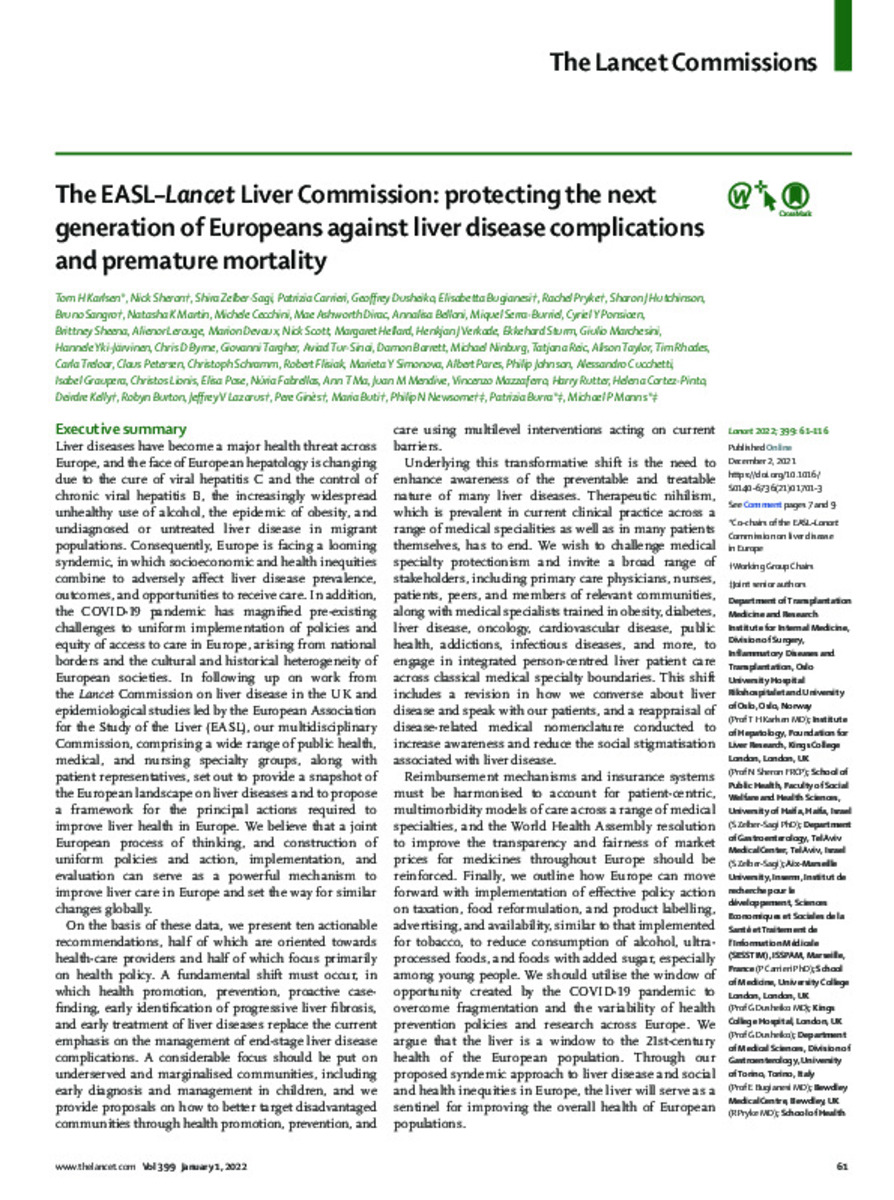Liver diseases have become a major health threat across
Europe, and the face of European hepatology is changing
due to the cure of viral hepatitis C and the control of
chronic viral hepatitis B, the increasingly widespread
unhealthy use of alcohol, the epidemic of obesity, and
undiagnosed or untreated liver disease in migrant
populations. Consequently, Europe is facing a looming
syndemic, in which socioeconomic and health inequities
combine to adversely affect liver disease prevalence,
outcomes, and opportunities to receive care. In addition,
the COVID-19 pandemic has magnified pre-existing
challenges to uniform implementation of policies and
equity of access to care in Europe, arising from national
borders and the cultural and historical heterogeneity of
European societies. In following up on work from
the Lancet Commission on liver disease in the UK and
epidemiological studies led by the European Association
for the Study of the Liver (EASL), our multidisciplinary
Commission, comprising a wide range of public health,
medical, and nursing specialty groups, along with
patient representatives, set out to provide a snapshot of
the European landscape on liver diseases and to propose
a framework for the principal actions required to
improve liver health in Europe. We believe that a joint
European process of thinking, and construction of
uniform policies and action, implementation, and
evaluation can serve as a powerful mechanism to
improve liver care in Europe and set the way for similar
changes globally.
On the basis of these data, we present ten actionable
recommendations, half of which are oriented towards
health-care providers and half of which focus primarily
on health policy. A fundamental shift must occur, in
which health promotion, prevention, proactive casefinding, early identification of progressive liver fibrosis,
and early treatment of liver diseases replace the current
emphasis on the management of end-stage liver disease
complications. A considerable focus should be put on
underserved and marginalised communities, including
early diagnosis and management in children, and we
provide proposals on how to better target disadvantaged
communities through health promotion, prevention, and
care using multilevel interventions acting on current
barriers.
Underlying this transformative shift is the need to
enhance awareness of the preventable and treatable
nature of many liver diseases. Therapeutic nihilism,
which is prevalent in current clinical practice across a
range of medical specialities as well as in many patients
themselves, has to end. We wish to challenge medical
specialty protectionism and invite a broad range of
stakeholders, including primary care physicians, nurses,
patients, peers, and members of relevant communities,
along with medical specialists trained in obesity, diabetes,
liver disease, oncology, cardiovascular disease, public
health, addictions, infectious diseases, and more, to
engage in integrated person-centred liver patient care
across classical medical specialty boundaries. This shift
includes a revision in how we converse about liver
disease and speak with our patients, and a reappraisal of
disease-related medical nomenclature conducted to
increase awareness and reduce the social stigmatisation
associated with liver disease.
Reimbursement mechanisms and insurance systems
must be harmonised to account for patient-centric,
multimorbidity models of care across a range of medical
specialties, and the World Health Assembly resolution
to improve the transparency and fairness of market
prices for medicines throughout Europe should be
reinforced. Finally, we outline how Europe can move
forward with implementation of effective policy action
on taxation, food reformulation, and product labelling,
advertising, and availability, similar to that implemented
for tobacco, to reduce consumption of alcohol, ultraprocessed foods, and foods with added sugar, especially
among young people. We should utilise the window of
opportunity created by the COVID-19 pandemic to
overcome fragmentation and the variability of health
prevention policies and research across Europe. We
argue that the liver is a window to the 21st-century
health of the European population. Through our
proposed syndemic approach to liver disease and social
and health inequities in Europe, the liver will serve as a
sentinel for improving the overall health of European
populations.







